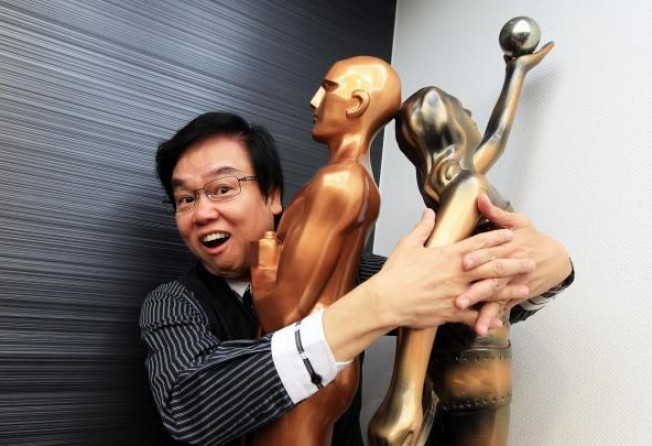
All's well with Raymond Wong
Comic actor and producer Raymond Wong Pak-ming talks about how he made it in Hong Kong and the mainland, writes Yvonne Teh

With appearances in 64 films stretching back to 1978, Raymond Wong Pak-ming is a familiar face to viewers of Hong Kong movies - all the more so since the baby-faced filmmaker doesn't look to have aged much over the years.
For most of his considerable career, the 66-year-old veteran has been associated with comedies, whether the Happy Ghost series (in which he played the eponymous character) or the All's Well, Ends Well movies, the first of which had a star-studded cast that included Stephen Chow Sing-chi, Leslie Cheung Kwok-wing, Sandra Ng Kwan-yu and Teresa Mo Sun-kwan.

And he still has time to make films: his Lunar New Year offering, Hotel Deluxe, is up against Chow's Journey to the West: Conquering the Demons and Eric Tsang Chi-wai's I Love Hong Kong 2013.
In 1980, Wong was one of three enterprising comedians who co-founded the Cinema City film company, under whose aegis 1980s classics such as Tsang's spy spoof, Aces Go Places, and John Woo Yu-sum's crime drama, A Better Tomorrow, were made. "In 1992, I started another company called Mandarin Films because my two [Cinema City] partners, Shek Kin and Karl Maka, retired," Wong says. In 2009, he established Pegasus Entertainment with his son, Edmond Wong Chi-woon.
This was also the year Wong senior returned to making comedies after a stint producing action movies that targeted the mainland market, following the implementation on January 1, 2004, of the mainland and Hong Kong Closer Economic Partnership Arrangement (Cepa).
For the Lunar New Year, you [want to] give the audience more choice
Almost from the start, Wong saw Cepa as a potential lifeline for Hong Kong's film industry, "because the Hong Kong market is going down, and the other markets - like Taiwan - really don't want to see Hong Kong movies [any more]. They see Hollywood movies [instead]".
Whereas, he says, "you can see the mainland box office growing rapidly. Before 2004, the box office was less than 1 billion yuan [HK$1.2 billion]. But nowadays, it's around 16 billion yuan". So, Wong says, "after Cepa 2004, I wanted to test this market". He found the mainland market strange: a film that works on one side of the border may not do well on the other. For example, the first Hong Kong-mainland co-production he was involved with, Tsui Hark's Seven Swords (2005), made a disappointing HK$8 million in Hong Kong but a hefty 80 million yuan on the mainland.
After seeing how Seven Swords, a period martial-arts drama about seven warriors who protect a village from a villainous general, fared at the mainland box office, Wong signed action choreographer and actor Donnie Yen Ji-dan for three movies. In 2008, the duo hit paydirt with Ip Man, an action-filled biopic of the wing chun master that earned 100 million yuan on the mainland. "After that, people accepted that Raymond Wong was a very good producer of action movies," Wong says, laughing.
Yet rather than resting on his action film laurels, Wong wanted to return to the genre he's most associated with in Hong Kong. "When I talked to the [mainland] distributors about comedies, they poured cold water over the idea. They told me: 'Your comedies cannot work in China because your Cantonese humour, when translated into Putonghua, [doesn't make anybody laugh].' But I needed to try."
For his first post-Cepa comedy, Wong dusted off the formula that served him so well in the 1990s: the family-oriented, festive All's Well, Ends Well series that were, he says, "tailor-made for the Lunar New Year, because [at this time], the oldest people were brought by their sons or grandsons to the cinema to watch a film together".
All's Well, Ends Well 2009 became "the Chinese movie champion of Hong Kong that year", he recalls; it also collected 40 million yuan on the mainland. "To me, that's a success."
But after four years of All's Well, Ends Well productions, between 2009 and 2012, the series' creator decided to "stop for a while and let other people create something else for the Lunar New Year". Rather than withdraw entirely from the festive market, however, Wong collaborated again with the director of All's Well, Ends Well 2009, Vincent Kok Tak-chiu, on Hotel Deluxe, a star-studded ensemble comedy set in a five-star hotel next to Hangzhou's Qiandao Lake but featuring a Hong Kong-heavy cast and a definite "Hong Kong style".
Hotel Deluxe is for Hong Kong people, he says firmly. Indeed, he considers its Hong Kong orientation to be the major selling point of the comedy, which revolves around a group of incompetent - but eager to please - hotel staff and their guests.
The cast includes three of the main stars of 2012 hit comedy Vulgaria (Chapman To Man-chat, Ronald Cheng Chung-kei and Fiona Sit Hoi-kei), along with three stars of 1992's All's Well, Ends W ell (Sandra Ng, Teresa Mo and Wong himself), and comics Eric Kot Man-fai and Jim Chim Sui-man. As Wong puts it: "These are people Hong Kong people like to see in movies, inside one movie."
Wong's Hotel Deluxe, Chow's take on Journey to the West and Tsang's I Love Hong Kong 2013 offer filmgoers choices - along with laughs - this Lunar New Year.
Hotel Deluxe opens on Thursday
